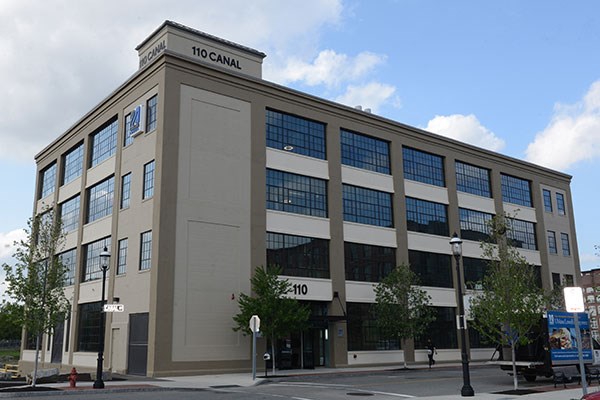
07/12/2015
Attleboro Sun Chronicle
LOWELL, Mass. (AP) — Medical-device companies are some of the most sought-after of any industry, with giants like Boston Scientific, Philips and plenty others lined along Route 128 and throughout Greater Boston.
An incubator space for similar businesses sits in Lowell, yet for years the Massachusetts Medical Device Development Center had limited room to accommodate a long wait list of start-ups wanting to use its lab space and its researchers.
Now, it finally has room to grow.
M2D2's shiny, modern and bright new space in the Hamilton Canal District that opened last month nearly doubles its square footage and more than doubles its laboratory space. It provides expensive and highly technical equipment that companies still in their infancy can use at affordable rates.
Without such incubators, newer companies would struggle to afford equipment they need to test and perfect their products, said Stephen McCarthy, a co-director at M2D2.
That's why UMass — in a partnership of both its Lowell and Worcester Medical School campuses — created M2D2, to help launch companies that the university and the city hope will flourish and remain in the area. M2D2 has become an often-cited example of the university's role in spurring new companies, and of its inter-campus collaboration.
The new M2D2 space, at the site of the former four-story Freudenberg Nonwovens mill now known as 110 Canal, received its occupancy permit a month ago.
On the top floor, rows of laboratory benches are bare except for one corner where an intern is working for KnipBio, a start-up that is creating genetically engineered bacteria. If successful, it would mean that much of the fish swimming in the ocean or harvested in fish farms aren't simply lost in the food chain to other fish.
KnipBio had several workers at the center on a recent weekday while the rest of the building was essentially empty.
The company is preparing for Food and Drug Administration trials in August, which Chief Operating Officer Jessica McLear said led to a "simmering, coming-to-a-boil feeling."
Larry Feinberg, its CEO, said the company, which was featured in May by National Geographic, considered geography, price and quality when searching for labs.
"Every dollar matters," Feinberg said. "Extra money you spend to be in Kendall Square in Cambridge takes away from money you can spend on your research."
Ideally, he added, the company would grow while staying in the Lowell area. "The nice thing about Lowell," McLear said, "is it's easy to get to."
In fact, that day, KnipBio had a visitor who took the commuter rail from Boston, then made the half-mile walk from the Gallagher Terminal.
KnipBio isn't the only M2D2 company looking to go big-time, of course.
Over at the center's space in Wannalancit Mills, a roster of start-ups is working on ideas like biodegradable stents, a wearable blood pump system for patients on dialysis, and a suture needle for medical staff that reduces the risk of clinicians pricking themselves during an operation.
About 10 of the start-ups that have filled up M2D2's Wannalancit Mills space have raised at least $1 million in venture funding, with several attracting more than $5 million. The largest, InfoBionic, has raised $20 million for its wireless patient-monitoring system.
InfoBionic, which has 21 employees and four interns, plans to go commercial with the MoMe Kardia at the end of the year.
M2D2 has become an important partner in the earliest stages in the life of a start-up, a period McCarthy calls the "valley of death" when a start-up has an idea it needs to develop but doesn't yet have investors or a marketplace-ready product.
McCarthy and his staff have reviewed product plans of about 100 start-ups in recent years. M2D2 has worked in some way with about half of those and about one-fourth have received product funding.
Those that M2D2 chooses to host have access to UMass Lowell and UMass Medical School researchers, along with UMass Lowell faculty in areas from engineering and physics to management and radiation.
The M2D2 staff has high hopes for the new space at 110 Canal, which was funded last year with a $4 million grant from the Massachusetts Life Sciences Center, the state's investment agency for the industry. The top floor has specialized labs and equipment, and the floor below has both open and private offices, along with a shared meeting room. There is lab capacity for more than 40 start-ups.
Most of the rooms remain vacant, but several have already set up offices, including Nonspec, a company making low-cost adjustable prosthetics aimed at those in developing countries. Start-ups often guard their products with a level of secrecy, but collaboration among the companies is a vital component of the process, McCarthy said.
M2D2, and city officials, hope the remaining two floors of 110 Canal — along with the vacant parcels that circle the building — could become home to start-ups that enter the marketplace and want to stay close to where they began.
The city has also set its sights high for what high-tech companies can do for Lowell's economy. In December, the City Council approved adopting a state law that allows communities to exempt research-and-development companies from paying personal property taxes on their core equipment.
"Now we're on an even keel with other communities that offer the same amenities," City Councilor Ed Kennedy, who proposed the tax break, said of the city's vote last fall. "They're the types of businesses we want to attract."
